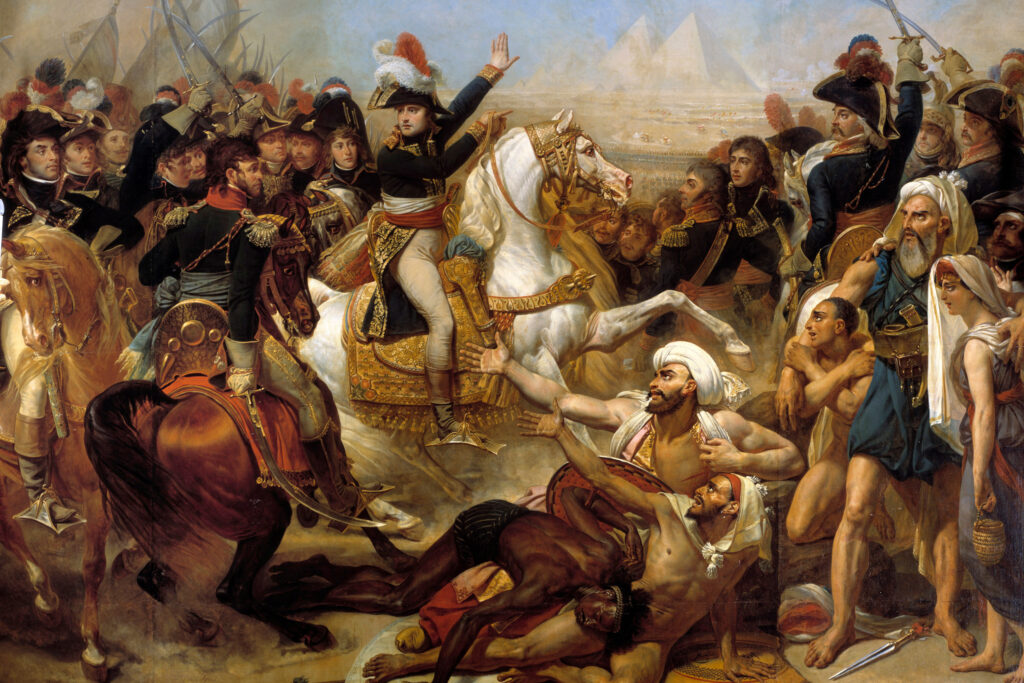The Clash of Civilizationalisms

During the past decade, there has been what might be called a global civilizational turn as states around the world have increasingly imagined themselves as the representatives of civilizations. A lot has been written about the way that China, India, Russia, and Turkey have framed their foreign policies in civilizational terms—and have even explicitly called themselves “civilizational states.” But many political leaders in Europe and the United States are also increasingly using civilizational language. The very concept of “the West,” which until a decade or so ago seemed to be in decline, is making a comeback, driven in part by the far right, which imagines Western or “Judeo-Christian” civilization as dangerously threatened by Muslim or non-white immigration. Some, like French President Emmanuel Macron, also speak of Europe as a distinct civilization that “can die.”
In order to understand these developments, academics are increasingly using the concept of “civilizationalism” (or “civilizationism”). In particular, the concept denotes the tendency to think of civilizations as distinct and coherent entities and to imagine international politics as a clash of civilizations, as Samuel Huntington famously did in his 1996 book. Civilizational thinking like this is a way of understanding how international politics works that is distinct both from realism (which sees international relations in terms of conflict and cooperation between nation-states) and liberalism (which emphasizes ideology and regime type).
How should we understand civilizationalism? Although there has been an explosion of civilization talk it is not entirely clear whether the concept of civilization is doing the same work in the many different contexts in which it is used. In particular, its exact relationship with the nation-state and with nationalism is disputed and varies across cases. The same goes for its relationship with racism, to which civilizationalism has been historically connected. Finally, whereas civilizationalism is often understood as a defensive foreign policy response to an overbearing West and an outright challenge by non-Western states to the post-WWII liberal international order, it also seems to be connected to domestic economic and political developments—in particular, to neoliberalism.
The Evolution of Civilizationalism
The idea of civilization goes back to the European Enlightenment. Although the ancient Greeks had contrasted the members of their own political communities with barbarians, it was only in the eighteenth century that the noun “civilization,” the verb “to civilize,” and the adjective “civilized” came to be associated with an ideal of civility that was potentially universal, even if it was assumed that Europeans had come closest to realizing it. The idea of civilization defined human progress in moral terms as “the movement from barbarism, the rude, uncultivated, uncivilized state of mankind, to the higher condition of refinement in thought and manners,” as the sociologist Krishan Kumar puts it.
In the nineteenth century, this understanding of civilization as a single process of human development, albeit with different nationalities, religions, or races at different stages of progress, gave way to an anthropological and historical understanding that defined civilizations as distinct entities, each equated with a particular “culture.” This idea of civilizations in the plural was in a sense more tolerant of difference than the normative idea of civilization in the singular. Yet it also further entrenched the imagined differences between groups of human beings—a tendency that was given scientific credibility with the emergence of biological racism in the late nineteenth century.
In the first half of the twentieth century, anxiety increased about the decline of the West in general (most famously articulated by Oswald Spengler in his book Der Untergang des Abendlandes, published in 1918) or of Europe in particular (most famously articulated by the French poet Paul Valéry, whom Macron has said is an influence on his own thinking about the “mortality” of European civilization). Meanwhile, figures like the Japanese art critic Okakura Kakuzō and the Bengali poet Rabindranath Tagore accused Western civilization of barbarism and celebrated an alternative approach based on diversity.
Although the idea of biological race was largely discredited by its association with Nazism—and by developments in science—the concept of civilization survived World War II. The British historian Arnold Toynbee continued the comparative study of civilizations in his 12-volume A Study of History (1934–61), though with a greater emphasis on the productive interconnections and interactions between civilizations. At the same time, the Cold War was framed as a civilizational struggle as well as an ideological one—the parties of the North Atlantic Treaty, signed in 1949, committed to defend “the civilisation of their peoples.”
Since the end of the Cold War, the public and scholarly debate around civilization has been predominantly associated with Huntington’s “clash of civilizations” thesis. Huntington predicted that, after the Cold War, conflict in international politics would be located at the “fault lines” between the nine civilizations that he identified, mainly on the basis of religion, but especially between the West (which he saw as “unique, not universal”), China, and Islam. Huntington’s vision of civilizational conflict can be thought of as a culturalist revival of earlier ideas of international relations as race relations.
Partly in response to Huntington’s essentializing analysis of civilizations, a new wave of research on civilizations has emerged. It has reframed civilizations not as clearly defined, objectively existing political entities but as “configurations, constellations, or complexes” that are “changeable, heterogeneous, interactive, and flexible.” In the words of Henry Hale and Marlène Laruelle, they are “not so much distinctive “’things’ that might ‘clash’” as “meaningful social imaginings” or “socially constructed supranational forms of identification that rely on political actors—including elites and citizens—to imbue them with meaning and create them as intersubjective realities.” In short, civilizations are reality-making rather than real.
However, even as academics have come increasingly to question the idea of coherent, distinct, objectively existing civilizations, politicians around the world have come to embrace what Blake Stewart has called “an ontology of civilizational blocs.” It is tempting to assume that this kind of civilizationalism is a function of illiberalism or populism and is therefore limited to the far right within the West and to figures like Narendra Modi in India, Vladimir Putin in Russia, and Recep Tayyip Erdoğan in Turkey. But liberal, anti-populist centrists like Macron have also used civilizational language in their own way.
Yet this global civilizational turn should not necessarily be understood as a straightforward resurgence of Huntington’s thesis. Many of those political figures who are now speaking in civilizational terms, especially outside the West, do not imagine a world defined by a clash of civilizations. Rather, they frame their civilizational claims as a step toward greater harmony between different powers—in short, as a kind of tolerant and particularist defense against what they perceive as a homogenizing Western universalism. Outside the West, civilizationalism is closely related to the ideas of multipolarity and the “democratization” of international politics. In that sense it may be more in line with Toynbee than Huntington.

Civilizational Complexities
The simultaneous invocation of the idea of civilization by such disparate political figures around the world suggests a single global phenomenon. But a closer examination reveals that the concept of civilization functions differently in different places. In particular, the way in which the concept is used within the West is very different from its uses outside the West.
Within the West, the idea of civilization almost always denotes a supranational entity. (The partial exception is France, which is sometimes imagined as a civilization—or European civilization, when it is imagined as an extension of France.) One consequence is that, in comparison to the nation, civilizational identity is only thinly institutionalized. The closest thing to a “civilizational state” within the West is the European Union, but since it is not technically a state it is perhaps more accurate to call it a “civilizational quasi-state.” NATO, which can be seen as the institutional embodiment of the West, is even further away from being a state.
By contrast, in other regions of the world the imagined civilizational community often roughly overlaps with an existing nation-state—what might be called “Westphalian civilizationalism.” Yet in these cases, the language of civilization is often used to justify territorial expansion. Erdoğan’s “neo-Ottomanism” expresses an aspiration to expand the influence of the Turkish republic to areas that were once under Ottoman rule. Similarly, the Indic civilizational imagination incorporates vast swathes of Asia. So is civilizationalism outside the West about consolidating the nation-state? Or is it about moving beyond the nation and reverting to a world of empires or at least spheres of influence?
In an influential paper published in 2017, the American sociologist Rogers Brubaker distinguishes between two ways of thinking about the European far right’s “civilizationism.” Its civilizational discourse can be understood as “a new articulation of nationalism”—simply “a new way of talking about ‘the nation.’” But it can also be seen as “an alternative to nationalism,” a reconceptualization of “the boundaries of belonging and the semantics of self and other” that refers to “a different kind of imagined community, located at a different level of cultural and political space, than national discourse.” Perhaps this distinction can also be applied to civilizationalisms outside the West.
This distinction in turn raises other questions about the relationship between nationalism and civilizationalism. We can think of civilizations as being imagined communities that are analogous to nations. (Part of the reason why the term “civilizationalism” is preferred to “civilizationism” is that it more closely follows the structure of the term “nationalism.”) But a civilization may be a different kind of imagined community. In particular, while left-wing nationalism clearly exists, it is more difficult to imagine a left-wing civilizationalism.
Scholars of nationalism have long sought to distinguish between ethnic/cultural and civic nationalisms, or at least ethnic/cultural and civic elements within nationalisms. Civic nationalisms have long been understood as emerging in the context of existing nation-states, whereas ethnic/cultural nationalisms have been associated with state-building national movements that tended to center on culture or language rather than institutions. Civilizationalism is inherently ethnic/cultural. This in turn may have to do with the way that, unlike nations, civilizations were generally not institutionalized as states.
This also brings us to the issue of the relationship between civilizationalism and racism. Within the West, where “civilization” has a long history as a kind of code word for race, civilizationalism can be understood as a soft form of racism based on culture rather than biology. In that sense, it is closely connected to what Étienne Balibar has called “neo-racism” or “cultural racism,” which is why it is so appealing to the far right: It allows it to articulate a sense of racial threat in softer, cultural terms.
The question is whether this also goes for civilizationalisms outside the West. In India, civilizational rhetoric translates Hindu majoritarian ideas into unobjectionable terms of culture and values just as Western civilizationalist discourse reframes discredited ideas of biological racism. But other cases are less clear. For example, Mark Bassin identifies two different variants of Russian civilizationalism: an ethnocultural version based on the idea of Russkiy mir (“Russian world”) and a “polyethnic” version based on the idea of Eurasia, which embraces the idea of diversity. The latter suggests that civilizationalisms are not automatically exclusionary.
The Drivers of Civilizationalism
What is driving the global civilizational turn? What work is the concept of “civilization” doing and why is it emerging in all these different contexts at around the same time? Why make claims about a civilizational identity rather than national or religious or ethnic identity? The answers seem to be connected to shifts in the international system and domestic economic and political developments (though, again, they may function somewhat differently in each case).
Huntington wrote The Clash of Civilizations during the “unipolar moment” in which the United States, and by extension the West, was at the peak of its relative power during the decade after the end of the Cold War. He predicted “civilizational rallying” by non-Western powers as a reaction to American hegemony and in particular to the liberal universalism it articulated. But twenty-first century civilizationalisms emerge from a different historical conjuncture, one in which a historic shift in the global distribution of power is taking place as the United States and the wider West decline and much of the rest of the world rises.
This fear of decline may explain the shift within the West away from liberal universalism and toward civilizationalist particularism. In particular, it has produced a kind of defensive civilizationalism focused on the protection of what is imagined as a threatened civilization, whether that civilization is framed broadly as Western or more narrowly as European. Within the West, centrists and the far right seem to be converging around this sense of threat, though whereas the far right tends to emphasize the civilizational threat from immigration, centrists tend to emphasize the civilizational threat from other powers like China and Russia.
For non-Western states like China, Russia, Turkey, and India, meanwhile, civilizational rhetoric conveys worldmaking ambitions for a multipolar order. It is recognition-seeking and aims to correct perceived asymmetries of global power. But if during the unipolar moment when Huntington was writing, the civilizationalism of these powers was defensive, now it is more aspirational and offensive. These civilizational states articulate new forms of normative power previously associated with the West, with China’s Confucius Institutes as a model. Hindu civilizationalists, for example, imagine India as the vishwaguru, or world teacher.
However, the shift in the global distribution of power is not the whole story. In order to understand the civilizational turn, we need to look not only at the international political environment but also at domestic developments. Within the West and especially within Europe, the civilizational turn seems to be connected to a particular form of neoliberalism that seeks to “encase” the economy and protect it from democratic interference. As economic policy has been taken out of the space of democratic contestation in the last several decades, especially within the eurozone, political debate has shifted to cultural issues. Civilizationalism is a kind of identity politics produced by neoliberalism.
In many non-Western countries, civilizational ideas have also become influential in the context of economic reform policies that opened up state-protected economies to the free flow of capital and market forces and drastically reworked the balance between public and private authority. Civilizationalism frequently serves as an idiom of legitimation for neoliberal reforms. For example, the Turkish state has used civilizational lessons about Ottoman practices of indigenous capitalism to justify neoliberal reforms while also championing civilization as a defense against the homogenizing effects of globalization. In China and India, civilizational assertions of power mirror the global aspirations of the new economic elites and middle classes and rationalize economic inequalities in terms of cultural reward.
For all the differences among them, all cases of civilizationalism around the world are emerging in a context in which the distinction between authoritarianism and democracy is increasingly blurred. Both within the West and outside it, democracies are showing authoritarian tendencies—often referred to as “democratic backsliding”—and producing hybrid regimes. Conversely, even authoritarian states like China feel the need to draw on democratic rhetoric to legitimate themselves. This is why the concept of civilization is so useful to political elites as a source of legitimacy.
Civilizationalism is not a phenomenon that should be identified exclusively with illiberal forces within and outside the West, as many seem to imagine. Rather, the global civilizational turn should be understood as a product of the way in which the boundaries between liberalism and illiberalism are becoming unclear as the center-right mainstreams and normalizes far-right ideas. If neoliberalism tends to produce identity politics, civilizationalism may be the form that this identity politics takes in a world in which international politics is increasingly being imagined as a competition between continent-sized powers.
This essay is informed by discussions in the Civilizationism Project. The authors are grateful to Thomas Hansen and the other members of the network.
Hans Kundnani is an Open Society Foundations Ideas Workshop Fellow and a Visiting Professor of Practice in the European Institute at the London School of Economics.
Srirupa Roy is professor and Chair of State and Democracy at the Centre for Modern Indian Studies (CeMIS), University of Göttingen.


